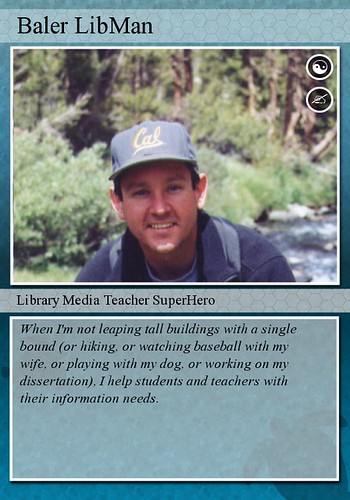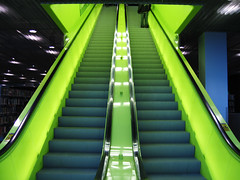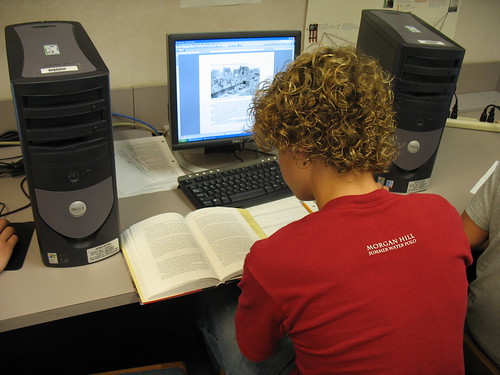Here's what Will Richardson has to say about wikis and student learning:
“The collaborative environment that wikis facilitate,” writes Richardson, “can teach students much about how to work with others, how to create community, and how to operate in a world where the creation of knowledge and information is increasingly becoming a group effort”(Blogs, Wikis, Podcasts and Other Powerful Web Tools for Classrooms, 2006). The power of the wiki is in its ability to facilitate colllaboration of a type and scale that has never been possible before.
Monday, May 7, 2007
Week 6: More Perspectives on School Library 2.0
One person who keeps pushing for real teaching and learning applications in School Library 2.0 is Chris Harris, blogging author of Infomancy .
Chris's piece in School Library Journal, "Say good-bye to your mother’s school library," articulates several ways to think about how to use Web 2.0 technologies to advace our goals, including:
-->Ramping Up Book Discussions--this is one application that seems to be ocurring to lots of folks, but Gigi Lincoln's "Student Reflections on Night by Elie Wiesel" remains a stellar example.
-->Discard the Flex vs. Fixed Model: A discussion about elementary libraries, Chris makes a compelling argument that web2.0 technologies will, sooner or later, make the notion of fixed vs. flex scheduling moot.
-->Push Library Services Out to the World: I think this has always been the goal of good libraries, and good librarians have taken advantage of new technologies at every turn to do this. From bookmobiles to telephone reference to web portals, IM reference and library blogs, the goal is to help our communities understand that library, like church, is about the spirit, not the building.
Chris's piece in School Library Journal, "Say good-bye to your mother’s school library," articulates several ways to think about how to use Web 2.0 technologies to advace our goals, including:
-->Ramping Up Book Discussions--this is one application that seems to be ocurring to lots of folks, but Gigi Lincoln's "Student Reflections on Night by Elie Wiesel" remains a stellar example.
-->Discard the Flex vs. Fixed Model: A discussion about elementary libraries, Chris makes a compelling argument that web2.0 technologies will, sooner or later, make the notion of fixed vs. flex scheduling moot.
-->Push Library Services Out to the World: I think this has always been the goal of good libraries, and good librarians have taken advantage of new technologies at every turn to do this. From bookmobiles to telephone reference to web portals, IM reference and library blogs, the goal is to help our communities understand that library, like church, is about the spirit, not the building.
Friday, May 4, 2007
Working on a Dissertation Is Not All Fun and Games
Create Your Own PaloozaHead - Visit Lollapalooza.com I was accused in this blog of not working diligently on my dissertation. I have to say, though, that diversions (music, hiking, silly play) and exercise are an important part of the process.
Wednesday, April 25, 2007
Week 5: I Never Knew I Was So Talented

These mashup tools and image generators make me feel like a pro. How easy it is to fool myself!
This cap is from ImageChef , which has lots of fun options. I also like GlassGiant which allows you to create messages out of cookies, by rewriting the "Hollywood" sign, or writing the title on a romance novel cover. These generators are ridiculously easy to use and guaranteed to help you waste hours of productive time!
Monday, April 9, 2007
Week 4: RSS Feeds and Bloglines
There are a dozen or so truly exceptional blogs on school libraries, teen resources, and educational technology. Among my favorites:
Will Richardson's Weblogg-ed
David Warlick's 2 Cents Worth
Jenny Levine's TheShiftedLibrarian
Amanda Doyle's TeenLibrarian
Joyce Valenza's NeverendingSearch
I just realized only one of these is specifically about school libraries. I always seem to look beyond my own spheres for new ideas.
Will Richardson's Weblogg-ed
David Warlick's 2 Cents Worth
Jenny Levine's TheShiftedLibrarian
Amanda Doyle's TeenLibrarian
Joyce Valenza's NeverendingSearch
I just realized only one of these is specifically about school libraries. I always seem to look beyond my own spheres for new ideas.
Sunday, April 8, 2007
Week 3: Cool Tools: Trading Card Maker

You can make your own trading cards at Trading Card Maker. Here's Baler LibMan, library superhero. Check out the very cool Concert Ticket Generator, too.
Week 3, "Thing" 5: Flickr accounts and Multimedia
It's COLD in here!

This represents everything wrong with the Seattle Public Library. It is by far the most cold, uninviting public library I've ever been in. (Photo by Serenity333, http://www.flickr.com/photos/neoserenity333/)
Saturday, March 17, 2007
Week 2: Setting up a Blog: What If I Came to Work and the Library Was Gone?
I have been thinking a lot lately about what would happen if I came to work one day and our library was gone.
Just the building.
Not the books, the technology, the infrastructure, the budget, the demand.
This question is helping me strip away the parts of the library program that are not building-dependent and pushing me toward developing more ability to expand our library beyond its walls.
Certainly, a web presence helps, but we need more than that. In a school setting, I find I need to be present in classrooms, on committees, in the lunchroom, and out in the quad with kids.
I need to push both print and digital resources to all reaches of our learning community.
If there were five of me, here are all the things I'd be doing:
Just the building.
Not the books, the technology, the infrastructure, the budget, the demand.
This question is helping me strip away the parts of the library program that are not building-dependent and pushing me toward developing more ability to expand our library beyond its walls.
Certainly, a web presence helps, but we need more than that. In a school setting, I find I need to be present in classrooms, on committees, in the lunchroom, and out in the quad with kids.
I need to push both print and digital resources to all reaches of our learning community.
If there were five of me, here are all the things I'd be doing:
- Booktalks in classrooms.
- Teacher/librarian collaboration on lessons across the curriculum, anytime information literacy involved (not just those that happen in the library).
- Regular staff development around ITC issues relevant to classroom teachers.
- Podcasts for teachers about how to incorporate a range of resources into their lessons
- Podcasts for teachers about implementing effective reading strategies
- Readers advisory as podcasts, both audio and video, by the librarian, teachers, staff, students, community members, and parents.
- A book club for teachers
- A book club for students
- A "Balers Read" book choice to read with the entire community, with accompanying promotional activities
That's just the beginning of my list. The second part of this scenario is considering what the library building actually is important for. At my school, it's a place where
- two classes can work together
- teachers and librarian can easily collaborate
- students can spread out to work on projects
- students can find a wide variety of resources in many formats and at many skill levels
- teachers can come to brainstorm ideas with the librarian and other teachers
- the entire school community can come to get suggestions about something good to read
- students can hang out before school, at lunch, after school, and four nights a week to study, do homework, get help from tutors or teachers, read for pleasure, explore the internet, get help on projects, try out new technologies, or just sit for awhile in a comfy chair or couch.
- students can come knowing it's a safe place where they'll be accepted
Subscribe to:
Comments (Atom)
